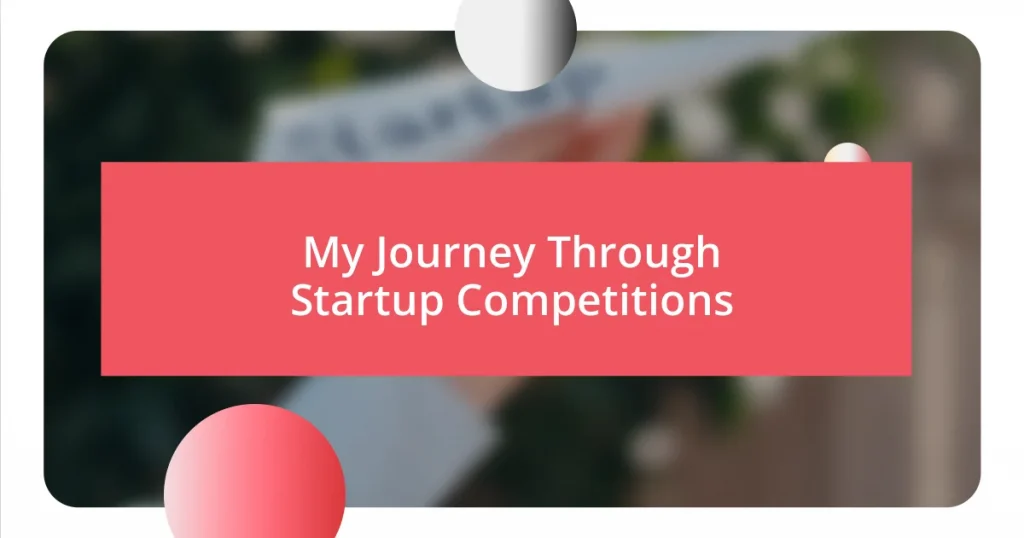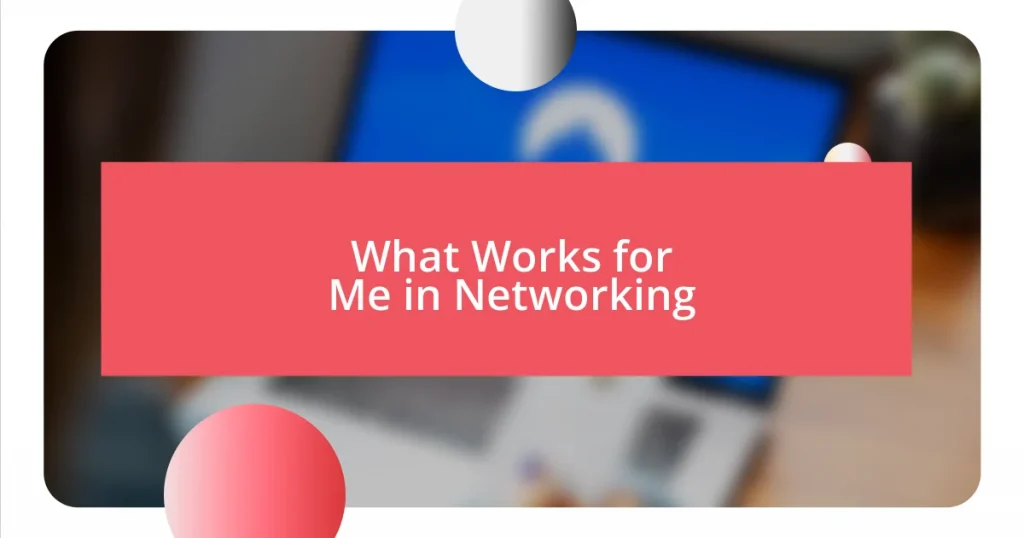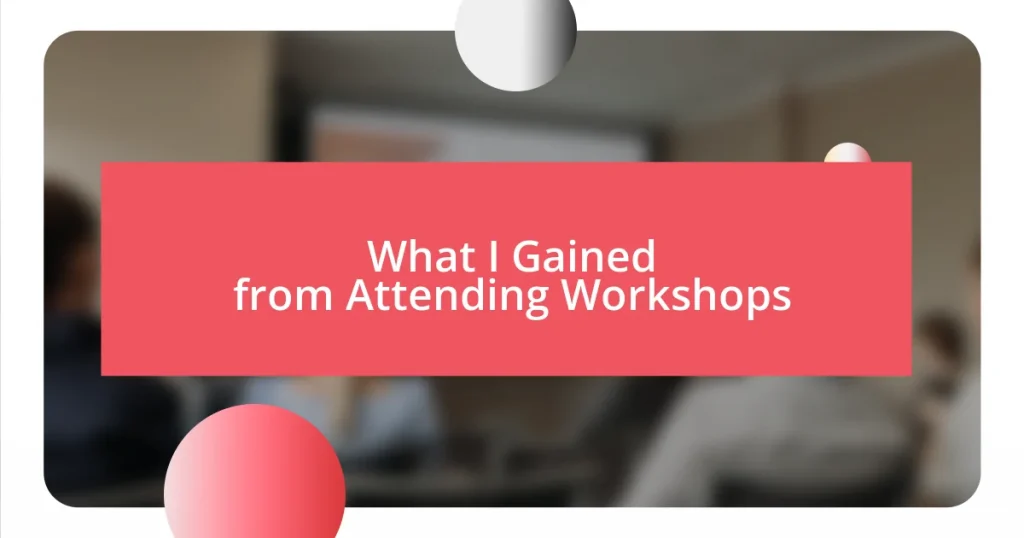Key takeaways:
- Authenticity and storytelling are crucial in creating a compelling pitch that resonates with judges and investors.
- Networking and mentorship during competitions provide invaluable support, guiding through feedback and relationship building.
- Embracing feedback and being adaptable post-competition enhances opportunities for growth and long-term success.
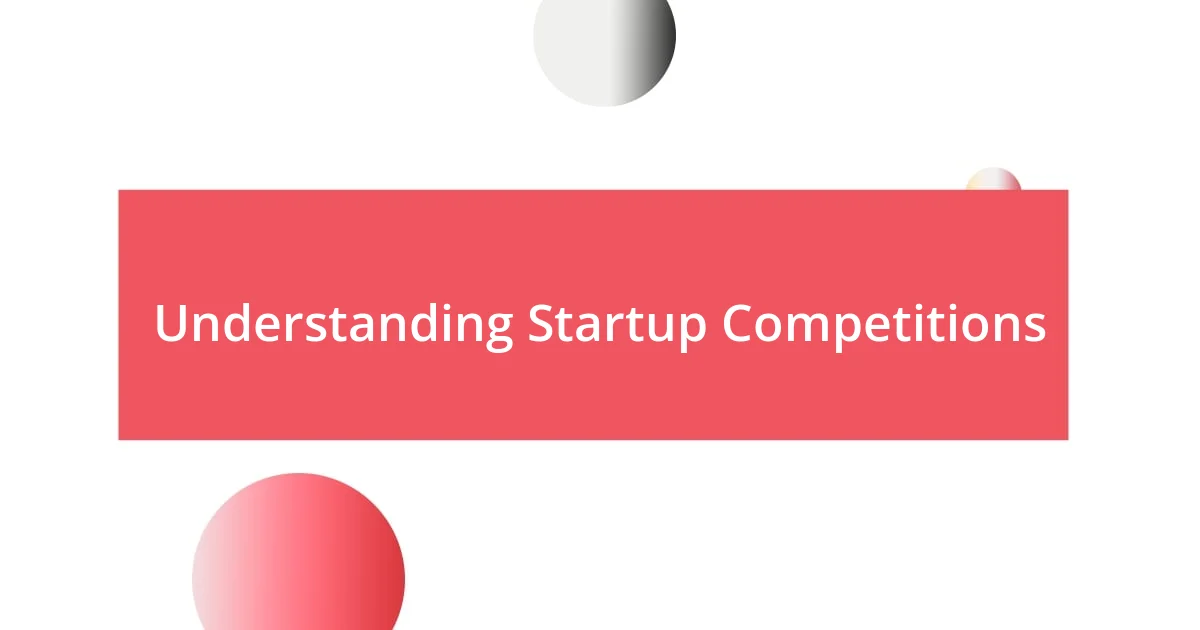
Understanding Startup Competitions
Startup competitions can be a unique blend of excitement and anxiety. I remember my first pitch—my hands were sweating, my voice quivered a bit, and that thrill of possibly sharing my idea with investors felt electric. Was that fear of failure worth it? Absolutely!
Each competition usually has its own criteria for judging, often focusing on innovation, market potential, and presentation skills. I learned quickly that it wasn’t just my idea that mattered; how I conveyed it made all the difference. What’s your story? Every pitch is a chance to connect your passion with the audience.
Participating in these competitions also opens doors to invaluable networks. I met mentors and fellow entrepreneurs who were navigating the same stormy seas. Isn’t it comforting to realize you’re not alone on this journey? This sense of community truly enhanced my experience and made me believe that every setback could lead to new opportunities.

Preparing for Your First Competition
Preparing for your first startup competition can feel like gearing up for a big performance. I still remember the late nights I spent rehearsing my pitch, pacing around my living room, trying to find the perfect way to communicate my vision. The pressure to impress judges is real, but I learned that authenticity resonates. Are you ready to share your story?
Researching the competition is essential. Each event may target different audiences and market segments, which influences what judges value most. I took the time to watch previous pitches online, jotting down what worked well and what didn’t. This gave me insights into how to tailor my approach and helped me feel more prepared. What resonated with you when you watched others pitch?
Practicing with friends or mentors is a game-changer. I organized a few mock pitches, and their feedback was invaluable. It was during a practice session that I discovered a clearer, more compelling angle for my presentation. That moment of improvement sparked a boost in my confidence, transforming my anxiety into excitement. How about you? Have you sought feedback before your big moment?
| Preparation Step | Personal Experience |
|---|---|
| Rehearsing Your Pitch | Paced around my living room, perfecting the delivery. |
| Researching the Competition | Watched previous pitches to understand what the judges appreciate. |
| Seeking Feedback | Mock pitches helped refine my message and boost confidence. |

Creating a Winning Pitch
Creating a compelling pitch is like crafting a captivating story—one that draws your audience in and makes them invested in your journey. I vividly recall the moment I decided to start with a strong hook. Instead of jumping straight into my business model, I opened with a personal anecdote that illustrated the problem I was solving. This approach not only humanized my pitch but also made it more relatable. Remember, people connect with stories, not just statistics.
To ensure my pitch stood out, I focused on these key elements:
- Clear Problem Statement: I articulated the challenge my startup was addressing, making it easy for everyone to understand.
- Engaging Solution Description: After identifying the problem, I painted a vivid picture of my innovative solution, showcasing its unique aspects.
- Personal Touch: Sharing why I was passionate about this project added authenticity and emotional weight to my presentation.
Being genuine can set you apart in a sea of competitors. Need an extra nudge? Practice in front of a mirror or record yourself. Watching it back can reveal nuances that you might miss otherwise and gives you a fresh perspective on how your pitch comes across. Trust me, those tweaks can make all the difference!
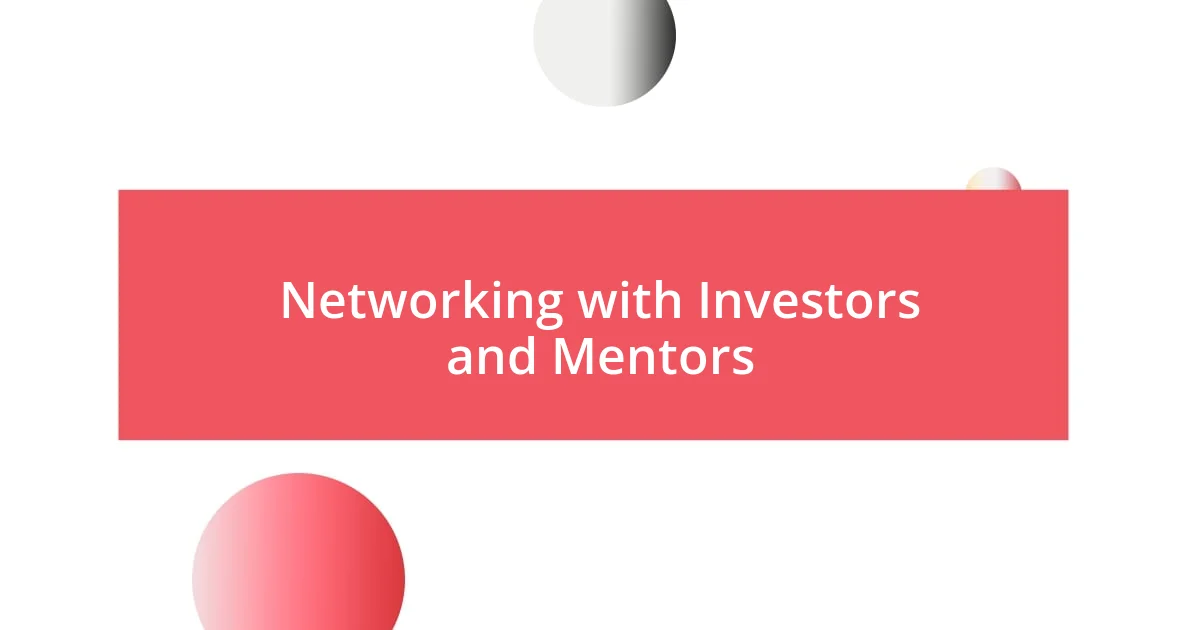
Networking with Investors and Mentors
Networking with investors and mentors during startup competitions is truly an enlightening experience. I remember the first time I approached an investor after a pitch. My heart raced, and I felt vulnerable, but that connection led to a constructive conversation that helped me refine my business strategy. Have you ever felt that electrifying rush of meeting someone who could significantly impact your journey?
Mentors play a crucial role in this ecosystem. I had a mentor who guided me through the nuances of effective networking. He emphasized the importance of genuine relationships over transactional ones. This mindset shift allowed me to connect authentically with investors and industry leaders, making those interactions not just beneficial, but also enjoyable. How do you approach building relationships in your journey?
As I navigated various competitions, I learned that follow-up is just as essential as the initial meeting. After connecting with investors, I made it a point to send personalized thank-you notes and updates on my progress. This simple act not only kept the lines of communication open but also demonstrated my commitment to the relationship. Have you considered how a small gesture can make a lasting impression?

Learning from Competition Feedback
Receiving feedback after each competition was a game changer for me. It’s fascinating how hearing different perspectives can shine a light on areas I hadn’t considered. I remember one judge remarking on my product’s usability. At first, I was defensive, but upon reflection, I realized they were right. This feedback sparked a revamp of my user interface that ultimately enhanced the user experience. Have you ever had feedback that initially stung but later became a catalyst for improvement?
I found that compiling all feedback into a structured document helped me identify patterns. For example, multiple judges pointed out the need for clearer metrics around our target market. This collective insight set me on a mission to conduct more research, which not only clarified my understanding but also strengthened my pitch in future competitions. Isn’t it amazing how small adjustments based on feedback can lead to significant growth?
In the end, I discovered that embracing criticism turns the competition experience into a valuable learning opportunity. Each piece of feedback became a stepping stone towards refining my business model, teaching me resilience in the face of challenge. Honestly, there were moments when I was overwhelmed, but the persistent pursuit of improvement kept me motivated. How do you lean into constructive criticism when it comes your way?

Scaling Your Startup After Competitions
Scaling your startup after competitions is an exhilarating but daunting journey. I vividly recall a moment just weeks after one competition when I put together a small team to tackle the feedback we received. It was a late-night brainstorming session fueled by takeout and enthusiasm, where we outlined not just the changes we needed to make, but also how we might pivot to explore new opportunities. It struck me how that initial momentum felt like a tide lifting us toward something bigger—have you ever experienced that rush of possibility when surrounded by the right people?
When we began implementing changes, the importance of clear communication came into play. I knew we had to articulate our vision and adjustments to our existing network, especially our investors. One evening, I sat down to draft an email, pouring out both the challenges we faced and the concrete steps we were taking. I felt nervous but also took comfort in knowing that transparency builds trust. Have you ever found that honesty about struggles can forge even stronger connections with your stakeholders?
One unexpected advantage I discovered was reinvesting winnings from competitions into targeted marketing strategies. These funds gave us the opportunity to experiment with ads and social media campaigns, allowing us to reach an audience I never thought possible. I’ll never forget the thrill of seeing engagement soar after a campaign we crafted based on insights gained during those competitions. It was a perfect example of how scaling isn’t just about growth; it’s about smart, informed decisions that leap off the foundation built through hard work and learning. What creative methods have you found to leverage resources gained from your own experiences?
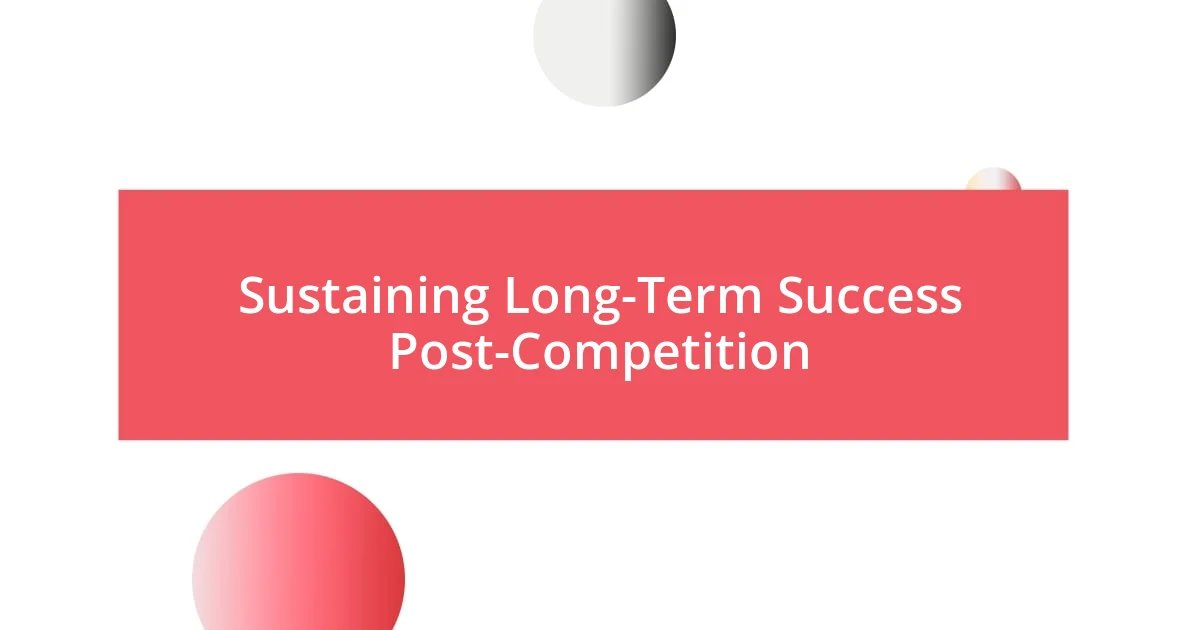
Sustaining Long-Term Success Post-Competition
Sustaining long-term success after competitions is about cultivating relationships and harnessing the lessons learned into actionable strategies. I remember reaching out to the mentors I met during my journey; their insights became an ongoing source of guidance. One evening, I felt particularly inspired after our call, realizing how these connections can be just as valuable as funding—have you ever noticed how a single conversation can reshape your path?
As we moved forward, it became apparent that maintaining momentum required a deliberate focus on team culture. We instituted regular check-ins to celebrate small victories and address challenges head-on. I’ve always believed that fostering an environment where everyone felt heard was essential. It’s amazing how such a simple practice transforms a group into a cohesive unit. How do you ensure your team stays engaged and motivated over time?
Finally, I’ve found that the ability to pivot—based on ongoing feedback and market insights—is crucial for sustained success. After one competition, I learned to embrace change; my initial reluctance turned into excitement when we redefined our product offerings. That moment taught me that adaptability not only keeps your startup relevant, but it also opens doors to new possibilities. Have you ever taken a leap of faith that reshaped your business direction for the better?










